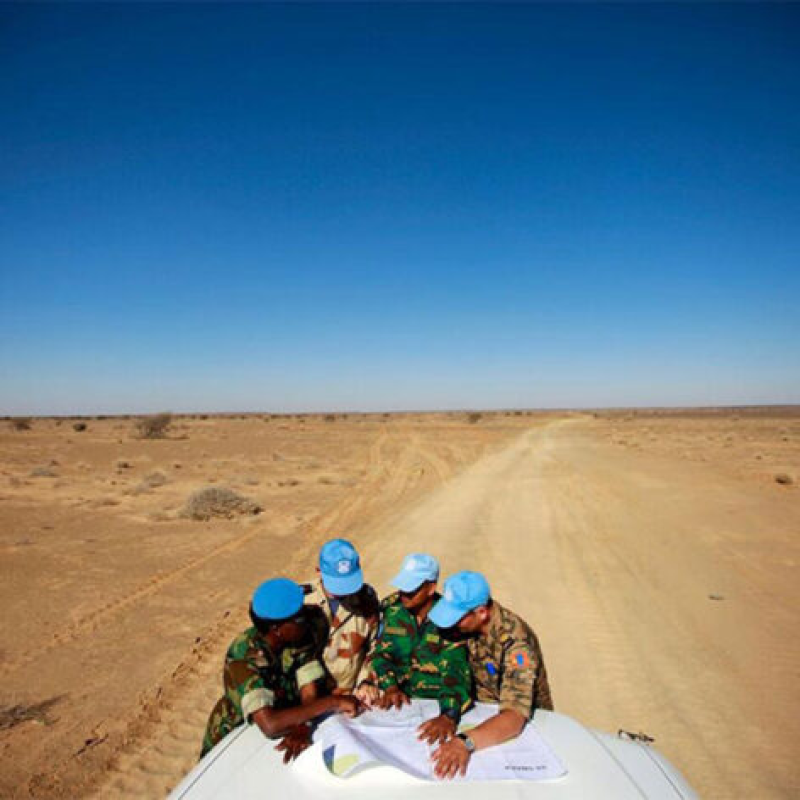- AI Moves Closer To Decoding Human Thoughts |
- UNESCO Calls Iran School Strike Grave Violation |
- Oil Jumps, Asian Stocks Slide On Gulf Tensions |
- Death toll from central Israel strike rises to 5 |
- DSE sinks 138 points on broad sell-off; CSE also tumbles |
Western Sahara: Africa’s Last Colony Renews Independence Fight

Credit: UN Photo
The African continent was once dominated by European colonial powers, with France ruling over 35 territories and Britain 32. That era of imperial domination has largely ended—almost.
Today, all African nations are members of the 55-state African Union (AU), except one: Western Sahara.
Described as a non-self-governing territory in northwestern Africa, Western Sahara remains the continent’s last colony. With an estimated population of around 600,000, it is Africa’s most sparsely populated territory and the world’s second most sparsely populated, consisting largely of desert flatlands.
A former Spanish colony, Western Sahara was annexed by Morocco in 1975. Since then, the region has been at the centre of a long-running territorial dispute between Morocco and the indigenous Sahrawi people, led by the POLISARIO Front.
On October 30, the UN Security Council is scheduled to vote on a draft resolution regarding the future of the UN Mission for the Referendum in Western Sahara (MINURSO).
According to reports, the United States has circulated a draft supporting Morocco’s 2007 autonomy plan as the basis for a mutually acceptable solution. The proposal, which also extends MINURSO’s mandate, calls for negotiations without preconditions and promotes Morocco’s plan as the “most feasible solution” for achieving “genuine autonomy within the Moroccan state.”
Dr Stephen Zunes, Professor of Politics and International Studies at the University of San Francisco and co-author of Western Sahara: War, Nationalism, and Conflict Irresolution, said the plan assumes Western Sahara is part of Morocco—a position long rejected by the UN, the World Court, the African Union, and much of international legal opinion.
He noted that Western Sahara is a full member of the African Union, while the UN classifies it as a non-self-governing territory.
“To accept Morocco’s autonomy plan would mean that, for the first time since the founding of the United Nations eighty years ago, the international community would be endorsing the expansion of a country’s territory by military force,” Dr Zunes warned. “This would set a dangerous precedent with serious implications for other occupied regions such as parts of Ukraine and Palestine.”
He added that a free and fair referendum resulting in a voluntary choice for autonomy would constitute legitimate self-determination. However, Morocco’s proposal explicitly “rules out, by definition, the possibility for the independence option to be submitted” to the Sahrawi people—most of whom, according to observers, favour full independence.
On October 24, Dr Sidi Mohamed Omar, Representative of the Frente POLISARIO to the UN and Coordinator with MINURSO, sent a letter to Russia’s UN Ambassador Vassily Nebenzia, current President of the Security Council, expressing strong opposition to the US draft.
The letter stated that the draft “marks a dangerous and unprecedented departure” from international law and undermines the foundations of the UN peace process in Western Sahara. It reaffirmed that any viable solution must respect the Sahrawi people’s right to self-determination in line with the UN Charter.
The International Court of Justice has confirmed that sovereignty over Western Sahara belongs exclusively to the Sahrawi people, who hold an inalienable and non-negotiable right to self-determination.
A UN Security Council report in October 2025 noted that the main challenge remains finding a lasting resolution to the decades-long deadlock over the territory’s status.
Two irreconcilable positions continue to block progress: the POLISARIO Front’s call for a referendum on independence, backed by the ICJ and numerous UN resolutions, and Morocco’s claim of sovereignty under its Autonomy Plan, which has gained growing support from several states.
Despite ongoing negotiations, hostilities persist at low to moderate intensity. Morocco currently controls more than three-quarters of Western Sahara and has invested heavily in the region, including a $1.2 billion port project in Dakhla. Moroccan settlers now make up nearly two-thirds of the area’s roughly half-million residents.
Dr Zunes further warned that Morocco’s track record raises doubts about the credibility of its autonomy offer. “The history of authoritarian states respecting regional autonomy is poor,” he said, citing the cases of Eritrea, Kosovo, and Hong Kong.
He added that Morocco has repeatedly broken promises regarding the UN-mandated referendum and ceasefire commitments. Key aspects of the autonomy proposal, including control over natural resources and law enforcement, remain vague, while powers not explicitly devolved to the autonomous region would remain with the Moroccan monarchy.
Under Article 19 of the Moroccan Constitution, the king retains absolute authority, including over defence, foreign affairs, and religious matters—giving him wide latitude to interpret and limit the scope of any autonomy arrangement.

